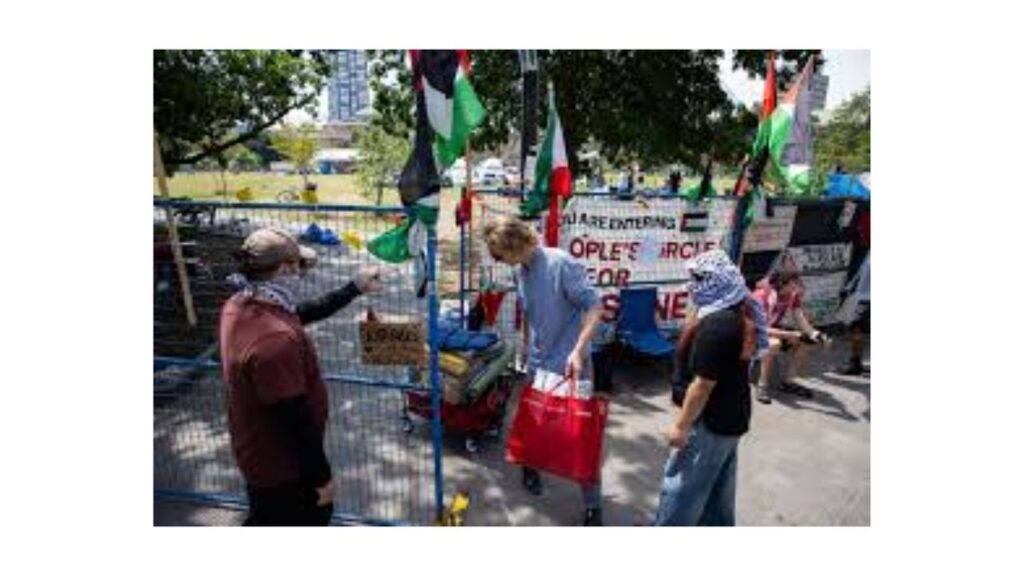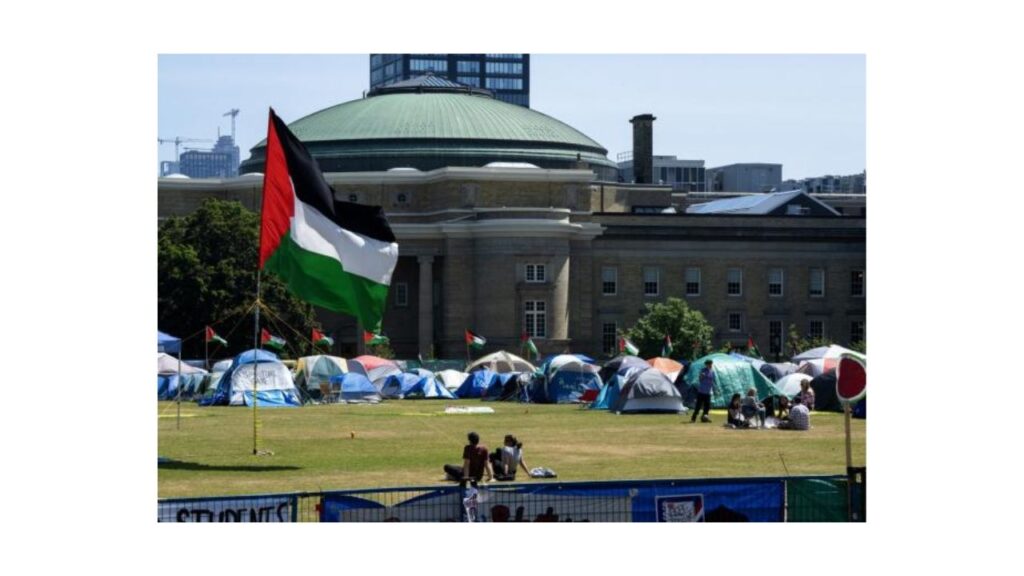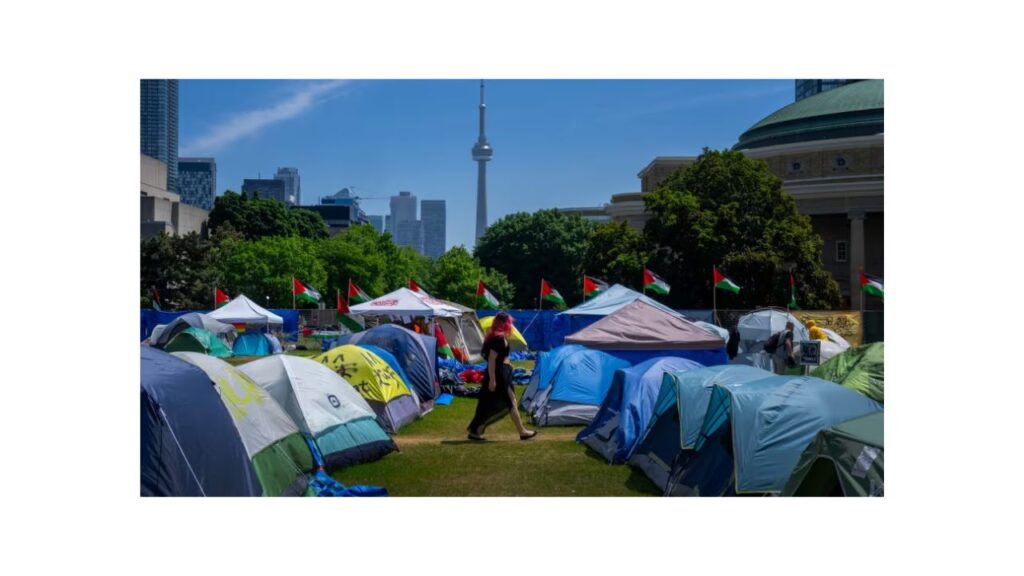In compliance with a court order, pro-Palestinian demonstrators who had been encamped on the downtown campus of the University of Toronto for two months packed up their tents and evacuated the area on Wednesday. Despite this, they vowed to keep applying pressure to the university until their demands are met.
About an hour before the 6 p.m. deadline, organizers declared their intention to follow the order and departed the location to continue their event, which drew a sizable crowd in support. Many marchers waved Palestinian flags during the event, which took place on campus and down College Street in the neighborhood.
According to Mohammad Yassin, the party chose to depart earlier than necessary in order to prevent a potential altercation with the authorities.
He declared, “To protect our community, we are leaving on our terms.”
Another group representative, Erin Mackey, claimed that the university had disregarded its obligation to pay attention to the faculty, staff, and students that make up the organization.
She argued, “Yet ignoring us will not make us go anywhere; we will still show up and demand divestment.” “We are going to keep showing up every day.”
By late afternoon, all of the tents and tarps that the demonstrators had set up had been removed.
Meric Gertler, the president of the university, expressed his satisfaction that the demonstrators followed the directive.
In a statement, he stated, “I am happy that the demonstrators have peacefully ended the encampment so that front campus can be restored and returned to the entire community.”
“People in our community are still able to use the University of Toronto to exercise their right to free speech and peaceful protest.”
The demonstrators were ordered by an Ontario judge on Tuesday to dismantle the encampment that they had established at King’s College Circle, which at one time had as many as 177 tents. The order was given two months ago.
The injunction gave police the right to intervene if protestors persisted at the location beyond Wednesday at six o’clock. Police had promised to uphold the ruling, but they did not provide any operational strategies.

According to Justice Markus Koehnen of the Ontario Superior Court, the demonstration had deprived the university of its authority over what transpires in King’s College Circle, even though there was no proof that the campsite participants had been violent or antisemitic.
According to Koehnen, property owners often control what occurs on their land, so if demonstrators are able to seize control of that authority, there won’t be anything stopping a larger group from moving in and occupying the area, which would cause pandemonium.
The demonstrators set up camp on May 2 and had earlier declared that they would remain there until the school complied with their requests, which included revealing and pulling out of investments in businesses that were making money off of Israel’s Gaza war.
According to the court judgment, the university has promised the protesters an expedited approach and has processes in place to assess demands for divestiture.
However, protestors have stated that they lack faith in the procedure because it is based on suggestions made to the university president, who has the option to accept or reject them. They point out that 16 years after the request was made, in 2016, Gertler refused to heed a suggestion to divest from fossil fuels and instead started his own process, which might lead to divestment by 2030.
The court ruling on Tuesday stated, “The protesters submit that Gaza does not have 16 years to wait.”
Because the campground was close to Convocation Hall, the site of the upcoming graduation ceremonies in June, the university first requested an immediate injunction against it in late May. The majority of the ceremonies had nearly concluded when the court finally convened for two days to hear arguments last month.

There were no notable disruptions noted.
In his ruling on Tuesday, the court stated that, despite the demonstrators’ “passion,” they lacked the authority to unilaterally dictate how the campus green space should be used by the use of “force, occupation, or intimidation.”
“Why should one haphazard group of people get to decide who can use that space for a period of more than 50 days if the land really is a quasi-public space?
“Depriving our fellow residents of green space accomplishes nothing, as passionate as we may be about alleviating human suffering around the world,” the judge stated.
However, pro-Israeli groups who had aimed to derail the demonstration repeatedly leveled accusations against the encampment activists, claiming that they had engaged in the trafficking of antisemitic hate speech and slogans. These claims were rejected by the court.
Although the judge stated that some remarks made on the “exterior of the encampment” qualified as hate speech, none of the protesters had been connected to those remarks, and they had actually taken action to remove objectionable signs when they surfaced close to the camp.
Conversely, the judge listed other instances in which the protesters themselves were the target of hate speech.
In support of his assertion that the campsite was peaceful, he presented testimonies from protesters who portrayed it as a welcoming, compassionate community in which Muslims and Jews had cooperatively organized Shabbat dinners and participated in prayer.
The ruling states that protestors claimed that criticism of Israel had been mistaken for antisemitism, creating a moral panic that had spread to include new forms of repression against individuals who stand out for Palestinian rights.
The judge noted that the respondents’ concerns about the possibility of a new McCarthyism were legitimate, alluding to the political repression campaign that stoked suspicions about purported communist influence in the US government in the 1940s and 1950s.
Protesters highlighted universities as important venues for protest and discussion, arguing that an injunction would be a significant violation of their right to free speech. But the judge determined that they had no right to occupy land that did not belong to them.
The judge stated that the university has stated that demonstrators are still free to express their opinions anywhere on campus, but they are not permitted to erect tents or barricade entrances to university property.
